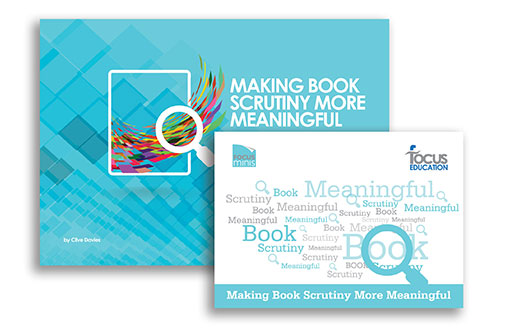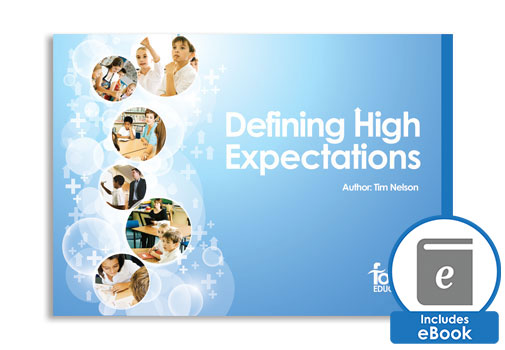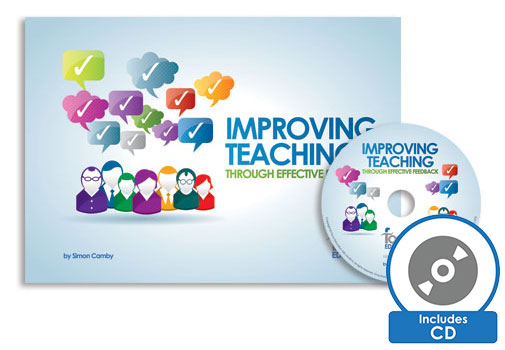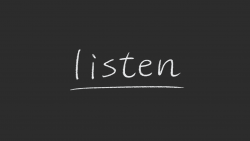
Let’s consider the importance of intervention in teaching by looking at it from the opposite perspective; that is, from a school where it is not a priority and does not form part of the underlying pedagogy.
Imagine you’re the visitor to that hypothetical school. Be ready to consider the impact on learning when intervention is not considered that important.
Got your DBS and proof of ID? Good. Just wait while their computerised signing-in system takes a grainy picture that makes you look like a ‘person of interest’ from Crimewatch CCTV footage. (Don’t worry. Chances are no-one will actually check the photo. After all, you look smart and have a clipboard.)
Now, welcome to the first classroom you visit…
“Hi, are you the visitor to our class? Yeah it’s okay to sit there. No one’s sitting there today. Beth’s got ‘flu from swimming so she’s away.
We’re doing maths now. We always do maths after the register. It was the same last year when I was a Year 3.
Well, I have this book for my work and sometimes we do sheets when it isn’t best stuff – data and graphs and stuff like that. They’re in the folders over there.
I’ve done the quick date because it’s maths so we’re allowed to use numbers. We do the proper date with words in other books after playtime, cos they’re writing so it has to be proper words. But numbers in maths are okay because it’s maths so we don’t use words.
Except for word problems. Then it’s okay coz they’re problems so they’re all written.
What are we learning? It’s up there on the board. I’m doing multiplying cos I’m a Triangle. Squares and Rectangles are doing division, and Circles have gone out to work with Mrs Gardner. They do that a lot. They aren’t good at maths so they go out of the room now to practice what we did in here last week. Mrs Gardner helps them. She’s brilliant at art. See that Roman over there? Who do you think it looks like? She done that.
And she does first aid.
I used to be a Rectangle y’know. Then we did a test and I was a Triangle. Don’t want to be a Square though. Too hard and they have to do problem solving all the time. Boffs.
This work? Well I’ve got these sums. Dunno…hang on…yeah, there’s some more on the next page so I’ve got thirty to do. Two digit times one digit. I’ve done sixteen so far.
I think they’re right. I dunno. Not sure about those ones. Or the ones with ‘8’ in. I’ll find out tomorrow or maybe Monday when they’ve got marked. I’ll carry on with the rest now anyway and hope that they are okay.
Mrs Kelly’s working with the Rectangles so we’ve got to get on. Unless it’s a ‘dire and terrible emergency’. That’s what Mrs Kelly says.
Hannah was stuck so I helped her. She’s a triangle too. We have to help each other. It’s a ‘class learning behaviour’ – like on the display over there.
So I let her copy my answers.”
“Well I’ve been a teaching assistant here for eleven years now since our Owen was in Year 5. I normally help out in Sarah Kelly’s class in the mornings, do the reading and phonics groups in the afternoon and then have a couple of sessions putting up displays. Have the kids shown you the Roman? They reckon he looks like the headteacher in a red dress covered in strips of tin foil. Cheeky so and so’s.
It’s the Circles I have mostly in maths. I take them out in the corridor and Sarah tells me what they need to do. I mark their books while she has them back for the plenary. I tried to mark while they work, but it’s hard when we have a lot to get through. And they need to do a lot if they’re ever going to catch up. And we don’t have much time really by the time they’ve moved out there in the corridor and sorted out their rulers and books. So I let them get on and do as much as they can without interrupting them if they are quiet. It’s Alfie I have to help the most, so that works well.
I meet with Sarah every week or two to chat about how the Circles are doing. She has to tick the boxes on the tracking system. Don’t ask me! The teachers did a teaching training day all about levels going last year, so I just tell her if the kids have done what she asked me to do with them.
Actually, thinking about it, that teaching training day was the day I did that Roman.”
“I’m Sarah. Sarah Kelly now since last year. But some of the younger children still call me Miss McGregor.
Well, I trained mainly for key stage 2 and really enjoy teaching Year 3 and Year 4 but I’d like to maybe move to key stage 1, probably Year 2 sometime.
For the experience and to see something completely different.
The deputy supported me when I started here two years ago. We watched lessons from other teachers in the school and she did observations and mentoring.
I’m lucky to have Mrs Gardner to take the Circles for maths. It means I can concentrate on the other groups. She’s great. Have you seen that Roman she did?
So we always plan a focus group in maths and English that I sit with and support. And I plan work for the other groups that they can access themselves and get on with. I’ve taught the children not to interrupt me or my group so we can really get on.
I rotate this on my weekly plan so I have the rectangles on Monday and so on.
So one day a week each child gets some really good teaching.
And we did a lot of work on learning behaviours so they support each other really well in independent work. Actually, Hannah told me that Jasmine really helped her with her maths this morning. And they’re both triangles, so that’s nice.
I try and set the groups plenty of work. It keeps them busy and the new end-of-year expectations are so hard! Have you seen what they need to be able to do? So I make sure they have plenty of work and they know where the extension sheets are if they finish. They can help themselves if they’ve done everything I set them.
I try to mark the work of my focus group as we go along. It doesn’t always happen because I don’t want to interrupt them if they’re working hard. It’s been a battle getting some of them to concentrate! I guess the amount I’m giving them to do in the lesson might look a bit daunting!
The rest I mark at the end of the day or at the weekend. I do try and give them time to read what I’ve written.
To be honest not many were on track by the end of the first term. We have a tracking system where we tick what they’ve done. Apparently, the school adapted the old system they had for levels, so they can produce spreadsheets and it goes red if the children aren’t on track and green if they are. The head likes spreadsheets I think.
Look…er…don’t tell the head will you? I mean…I know what we’ve done so far as a class, but I’m really worried that I don’t really know what the children in my class have actually learned.
And I’ve no idea how I’m going to assess whether they’re ‘working at greater depth’. I guess, maybe that’ll be the ones who finish quickly and do the extension sheets?”
The Impact of Intervention
Ok, so that might seem to give extreme views, stereotyped for effect. Fair enough. They are.
But consider what the pupils and staff in your setting would say in similar circumstances. What is the actual impact of adult intervention on learning and progress? How different would the comments be in your school from those above?
Why not focus on this and ask the relevant questions during your next round of monitoring? This might enable you to evaluate the true effectiveness of intervention in your setting.
Related Products
Tim has been a headteacher with a successful track record; his last school had a reputation for innovation and their initiatives have been utilised by others and presented internationally.
School improvement has been at the heart of his career, working as an LLE, a School Improvement Partner, Professional Partner as well as an Ofsted inspector and mentor for trainee inspectors.










